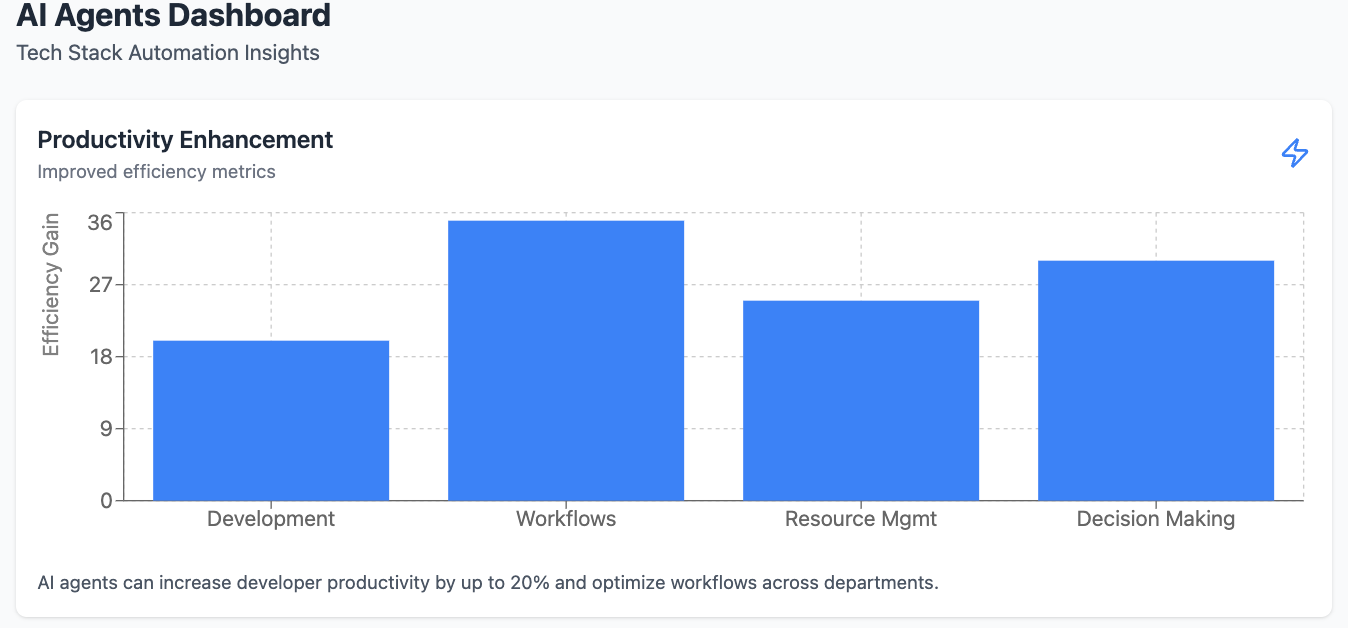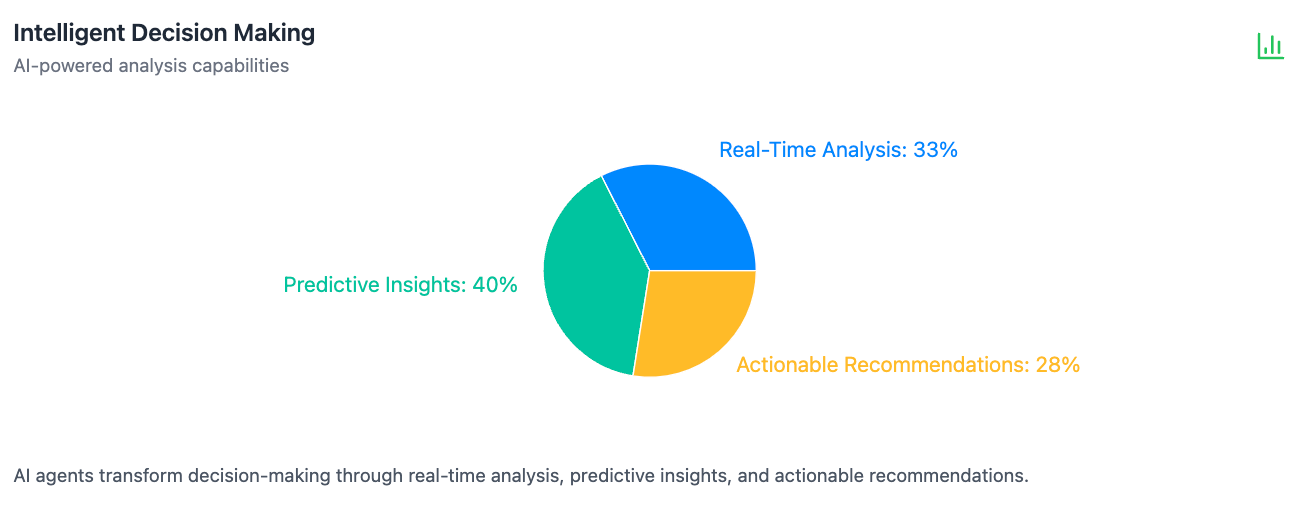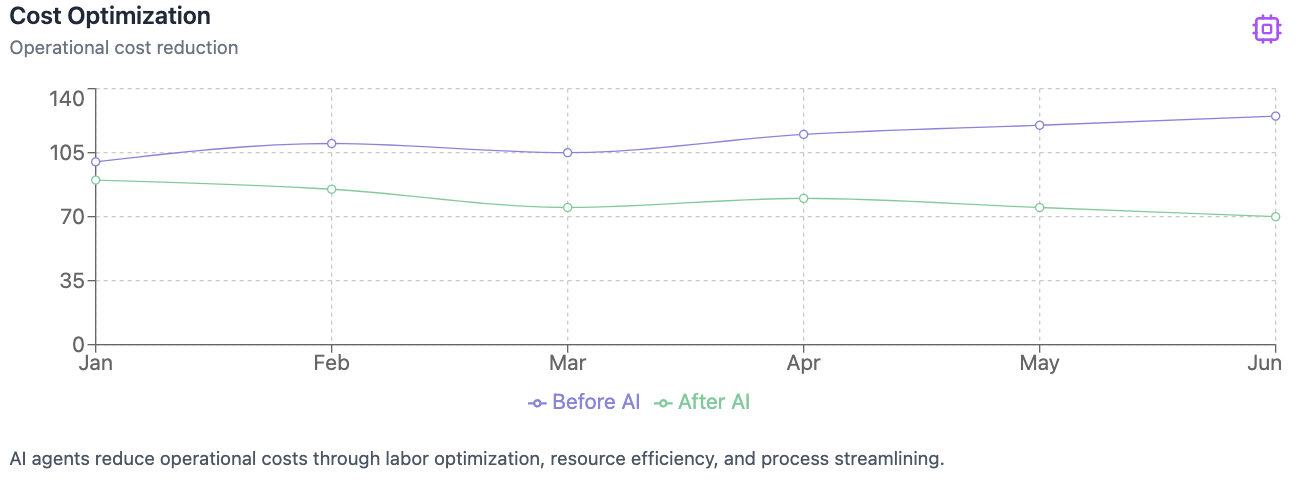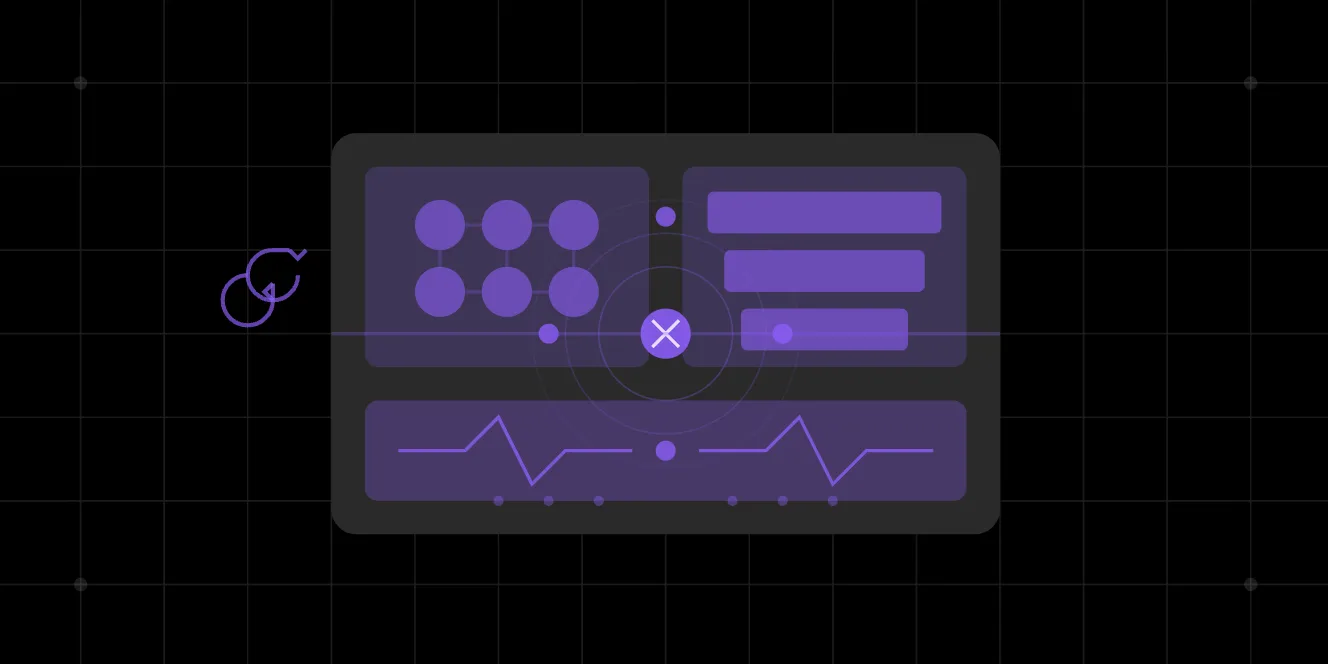Transform Operations with AI Agents for Tech Stack Automation Success
Transform Operations with AI Agents for Tech Stack Automation: The AI Revolution for Business Advantage
In today’s rapidly evolving digital landscape, businesses face increasing pressure to optimize operations, reduce costs, and deliver exceptional experiences. AI adoption is crucial for integrating AI agents into business operations, enhancing efficiency and innovation. Artificial intelligence agents have emerged as a transformative force in tech stack automation, offering unprecedented capabilities to streamline workflows, enhance decision-making, and drive operational excellence. Let’s explore how these intelligent agents are revolutionizing business operations and creating competitive advantages across industries.

Understanding AI Agents in Tech Stack Automation
AI agents represent a significant evolution beyond traditional automation tools. Unlike simple rule-based automation that follows predetermined paths, AI-powered agents can perceive their environment, make decisions, learn from outcomes, and adapt their behavior accordingly. These agents can be developed and deployed across enterprises, integrating into various applications and leveraging data from sources such as Google Search and organizational repositories. This autonomy and intelligence enable them to handle complex, variable tasks across the technology stack—from infrastructure management to application development and business process optimization.
AI Agent Capabilities
Automate
AI workflows enhance traditional systems with AI capabilities for adaptive decision-making. This allows AI agents to manage complex data and improve operational efficiency through context-aware processes.
What are AI Agents?
AI agents are sophisticated software programs designed to operate independently, making decisions based on predefined rules and data inputs. Unlike traditional software, AI agents can autonomously plan strategies and refine their approach over time, thanks to advanced techniques like machine learning. This continuous improvement allows AI agents to enhance their performance across a wide range of applications.
In the business world, AI agents are transforming operations by handling tasks that were once time-consuming and labor-intensive. For instance, in customer service, AI agents can manage support tickets, provide instant responses, and even predict customer needs. In IT, they can automate routine requests and monitor system health. Additionally, AI agents play a crucial role in robotic process automation, streamlining processes such as supply chain management and administrative tasks. By enabling AI agents to take on these responsibilities, businesses can achieve greater efficiency and focus on strategic initiatives.

AI Agent Capabilities
AI agents can be envisioned through three primary capabilities: Assist, Augment, and Automate. Each capability plays a unique role in enhancing business operations:
-
Assist: AI agents provide valuable information and support to users. They can answer queries, offer recommendations, and guide users through complex processes. This capability is particularly useful in customer service and technical support, where timely and accurate information is crucial.
-
Augment: By automating routine tasks, AI agents significantly boost user productivity. They handle repetitive activities such as data entry, scheduling, and document processing, allowing employees to focus on more strategic and creative tasks. Additionally, AI agents can provide insights and analytics, helping users make informed decisions.
-
Automate: The most advanced capability, Automate, enables AI agents to perform tasks autonomously. They can make decisions and take actions without human intervention, managing complex workflows and processes. This includes everything from predictive maintenance in manufacturing to dynamic resource allocation in IT infrastructure.
By incorporating these capabilities, AI agents can adapt to various contexts and software environments, providing tailored solutions that meet specific business needs.

AI Agent Tech Stack: Essentials for Enterprise Software
The AI agent tech stack is a multi-layered architecture designed to support the effective operation of AI agents within enterprise environments. It consists of four essential layers:
-
User Engagement: This layer focuses on how AI agents interact with users, providing intuitive interfaces and seamless experiences. It includes chatbots, virtual assistants, and other user-facing applications that facilitate communication and task execution.
-
Application Services: These services enable AI agents to perform specific tasks and functions. They leverage advanced AI models and algorithms to process data, make decisions, and execute actions. This layer includes tools for natural language processing, machine learning, and task automation.
-
Data Management: A critical component of the tech stack, data management ensures that AI agents have access to high-quality, relevant data. This layer includes databases, data lakes, and data warehouses that store and organize structured and unstructured data. Effective data management is essential for accurate decision-making and efficient operation.
-
Software Ecosystem: The foundation of the AI agent tech stack, this layer includes the underlying infrastructure and platforms that support AI agent deployment. It encompasses cloud services, APIs, and integration frameworks that enable AI agents to operate within the broader enterprise ecosystem.
By leveraging these four layers, businesses can create a robust and scalable environment for AI agents, ensuring they deliver maximum value and performance.
Data Management and Quality
Data management is a cornerstone of the AI agent tech stack, as AI agents rely on high-quality data to make informed decisions and take effective actions. Vector databases play a pivotal role in this process, enabling the storage and management of vast amounts of structured and unstructured data. These databases allow AI agents to perform complex searches, summarize information, and extract valuable insights from diverse data sources.
Semantic layers further enhance data management by acting as intermediaries between complex enterprise data and AI agents. They translate business-friendly questions into precise database queries, ensuring that AI agents can retrieve the necessary information quickly and accurately. Additionally, APIs are crucial for enabling AI agents to access structured data, perform semantic searches, and orchestrate actions across different systems.
By prioritizing data quality and leveraging advanced data management tools, businesses can ensure that their AI agents operate with the most accurate and relevant information, leading to better decision-making and more efficient processes.
AI Powered Application Services
AI-powered application services are designed to enable AI agents to perform complex tasks and make autonomous decisions. These services leverage large language models to process natural language inputs, infer user intent, and monitor task progress. By understanding and interpreting human language, AI agents can interact more naturally with users and provide more accurate responses.
A multi-agent architecture allows AI agents to work collaboratively, with coordination agents assigning tasks and monitoring the activity of specialized agents. These specialized agents are designed to carry out specific jobs based on unique instructions, ensuring that each task is handled by the most appropriate agent.
Integration with existing systems and databases is essential for the smooth operation of AI agents. By connecting to enterprise software and data sources, AI agents can access the information they need to perform their tasks effectively. This integration ensures seamless data flow and coordination across the organization, enabling AI agents to deliver consistent and reliable performance.
By leveraging AI-powered application services, businesses can deploy AI agents that are capable of handling complex tasks, making informed decisions, and operating autonomously, ultimately driving greater efficiency and productivity.
Transforming Productivity and Operational Efficiency
Perhaps the most immediate impact of AI agents is their ability to dramatically enhance productivity across the organization:
Development Acceleration
In software development environments, AI agents are revolutionizing how teams work:
-
Automated code generation creates functional code based on natural language descriptions, reducing development time
-
Continuous testing and quality assurance identifies bugs and vulnerabilities without manual intervention
-
Self-healing systems detect and resolve infrastructure issues before they impact operations
These capabilities can increase developer productivity by up to 20%, allowing technical teams to focus on innovation rather than routine coding and maintenance tasks.
AI Workflows Optimization
Beyond development, AI agents streamline complex workflows throughout the organization by effectively navigating and providing insights from complex data structures:
-
Process automation handles repetitive tasks across departments without human intervention
-
Intelligent document processing extracts, categorizes, and routes information from unstructured documents
-
Cross-system orchestration coordinates activities across multiple platforms and applications
By automating these processes, organizations can reallocate human resources to higher-value activities that require creativity, emotional intelligence, and strategic thinking.
Resource Optimization
AI agents excel at optimizing how resources are allocated and utilized:
-
Dynamic resource allocation ensures computing resources are deployed where they’re most needed
-
Energy management minimizes power consumption in data centers and infrastructure
-
Capacity planning predicts future resource requirements and prevents bottlenecks
This intelligent resource management minimizes waste, improves sustainability, and ensures optimal performance even during peak demand periods.
Enhancing Decision-Making Through AI Powered Intelligent Analysis
The analytical capabilities of AI agents transform decision-making processes across the organization:
Real-Time Data Analysis
AI agents can process and analyze vast amounts of data at speeds impossible for human analysts:
-
Pattern recognition identifies trends and anomalies across operational data
-
Correlation analysis discovers relationships between seemingly unrelated events
-
Time-series analysis tracks performance metrics over time to identify cyclical patterns
These analytical capabilities provide unprecedented visibility into operations, enabling more informed decision-making at all levels.
Predictive Insights
Beyond analyzing current data, AI agents can anticipate future conditions:
-
Predictive maintenance forecasts equipment failures before they occur
-
Demand forecasting anticipates customer needs and market trends
-
Risk modeling identifies potential threats to business operations
These forward-looking insights enable proactive management, allowing organizations to address issues before they impact performance and capitalize on emerging opportunities.
Actionable Recommendations
AI agents don’t just analyze data—they provide specific recommendations for action:
-
Decision support offers evidence-based suggestions for complex choices
-
Scenario modeling evaluates potential outcomes of different decisions
-
Optimization recommendations suggests specific changes to improve performance
By combining historical data with current conditions and strategic objectives, AI agents provide context-aware recommendations that drive better business outcomes.
Enabling Seamless Integration and Unlimited Scalability
AI agents excel at breaking down silos and creating cohesive technology ecosystems:
Cross-System Integration
Modern enterprises rely on dozens or even hundreds of different systems. AI agents bridge these systems:
-
API integration connects disparate platforms without extensive custom development
-
Data synchronization ensures consistent information across all systems
-
Workflow orchestration coordinates processes that span multiple applications
This integration capability creates a cohesive technology environment where information flows freely and processes run smoothly across system boundaries.
Adaptive Scalability
As business needs grow and change, AI agents scale effortlessly:
-
Horizontal scaling handles increased workloads by distributing tasks across additional resources
-
Complex process management maintains performance as workflow complexity increases
-
Learning capabilities improve efficiency over time as the agent processes more data
This scalability ensures that automation solutions grow with the business, providing consistent performance even as operations expand and evolve.
Agile Development Support
In today’s fast-moving business environment, agility is essential. AI agents enhance development agility:
-
Rapid prototyping accelerates the creation of new applications and services
-
Continuous integration and deployment streamlines the release of new features
-
Adaptive testing ensures quality across an expanding codebase
These capabilities enable organizations to respond quickly to changing market conditions and customer needs while maintaining high quality standards.
Driving Significant Cost Optimization
The financial benefits of AI agent implementation extend across multiple dimensions:
Operational Cost Reduction
AI agents directly impact the bottom line by reducing operational expenses:
-
Labor optimization reduces costs associated with routine, repetitive tasks
-
Resource efficiency minimizes waste in computing resources, energy, and materials
-
Process streamlining eliminates unnecessary steps and activities
These efficiencies translate into significant cost savings that improve profitability and competitive positioning.
Error and Risk Mitigation
The costs associated with errors and compliance issues can be substantial. AI agents help mitigate these risks:
-
Quality assurance catches errors before they impact operations or customers
-
Compliance monitoring ensures adherence to regulatory requirements
-
Security management identifies and addresses vulnerabilities proactively
By preventing costly mistakes and compliance failures, AI agents protect both finances and reputation.
Supply Chain Optimization
For organizations with physical products, supply chain management represents a major cost center:
-
Inventory optimization ensures the right stock levels at the right locations
-
Supplier management identifies the most cost-effective and reliable vendors
-
Logistics optimization reduces transportation and warehousing costs
These improvements reduce carrying costs, minimize stockouts, and ensure efficient operations throughout the supply chain.
Elevating User Experience for Customers and Employees
The impact of AI agents extends to both external customers and internal users:
Enhanced Customer Engagement
AI agents transform how organizations interact with customers:
-
24/7 support availability through intelligent virtual assistants and chatbots
-
Personalized interactions based on customer history and preferences
-
Proactive service that anticipates and addresses customer needs before they’re expressed
These capabilities improve customer satisfaction, increase loyalty, and drive revenue growth through enhanced customer relationships.
Streamlined Employee Experience
Internal users benefit equally from AI agent implementation:
-
Reduced administrative burden through automation of routine tasks
-
Intelligent assistance that provides relevant information and guidance
-
Simplified interfaces that adapt to individual user needs and preferences
By improving the employee experience, organizations can boost productivity, reduce turnover, and create a more engaging work environment.
Continuous Improvement
Perhaps most importantly, AI agents enable continuous experience improvement:
-
User behavior analysis identifies friction points and opportunities for enhancement
-
Sentiment analysis gauges emotional responses to interactions
-
A/B testing evaluates alternative approaches to determine optimal experiences
This continuous improvement process ensures that both customer and employee experiences remain competitive and effective over time.
Implementation Considerations for Maximum Impact
While the benefits of AI agents are substantial, successful implementation requires careful planning and execution:
Strategic Alignment
AI agent implementations should align with broader business objectives:
-
Clear goal definition to ensure automation efforts address priority areas
-
ROI modeling to identify the most valuable automation opportunities
-
Change management planning to prepare the organization for new ways of working
This strategic approach ensures that AI agent investments deliver maximum business value.
Integration Architecture
The technical foundation for AI agents must support seamless operation:
-
API and data strategies that ensure agents can access necessary information
-
Security frameworks that protect sensitive data and systems
-
Governance processes that maintain oversight while enabling agent autonomy
A well-designed architecture ensures that agents function effectively within the existing technology landscape.
Human-AI Collaboration
The most successful implementations leverage the complementary strengths of humans and AI:
-
Role clarity defining which tasks are handled by agents versus humans
-
Feedback mechanisms allowing humans to correct and guide agent behavior
-
Skills development preparing employees to work effectively alongside AI systems
This collaborative approach maximizes the value of both human and artificial intelligence within the organization.
Conclusion: The Competitive Imperative of AI Agents
As AI agent technology continues to advance, it is becoming a critical differentiator in competitive markets. Organizations that successfully implement these intelligent automation solutions gain significant advantages in efficiency, agility, cost structure, and customer experience.
The question for forward-thinking leaders is no longer whether to adopt AI agents for tech stack automation, but how quickly and effectively they can implement these technologies to transform their operations. Those who move decisively to embrace this revolution will be well-positioned to thrive in an increasingly competitive and rapidly evolving business landscape.
This article explores how artificial intelligence agents are transforming tech stack automation through enhanced productivity, intelligent decision-making, seamless integration, cost optimization, and improved user experiences—enabling businesses to achieve operational excellence and competitive advantage in the digital age.
